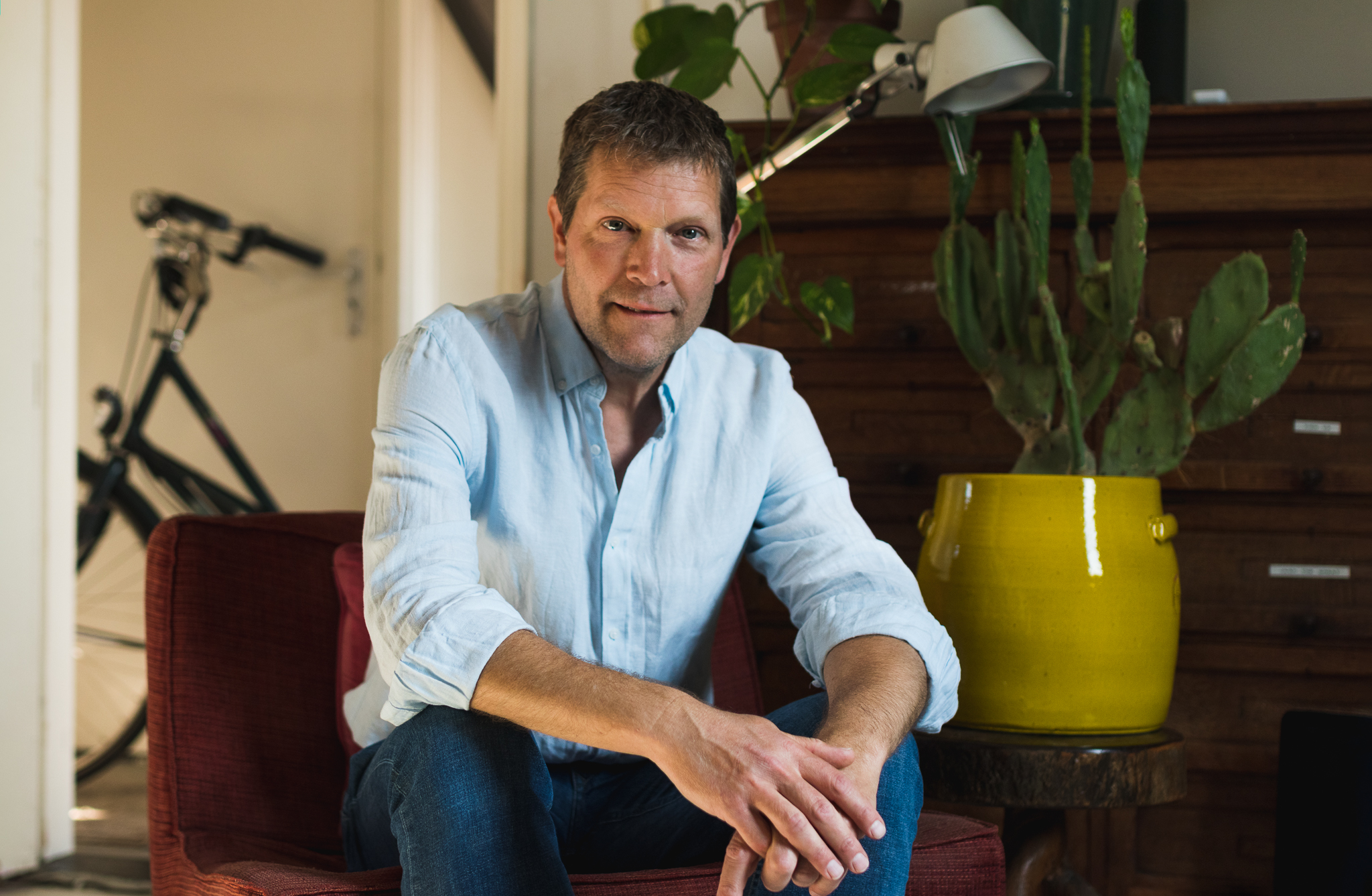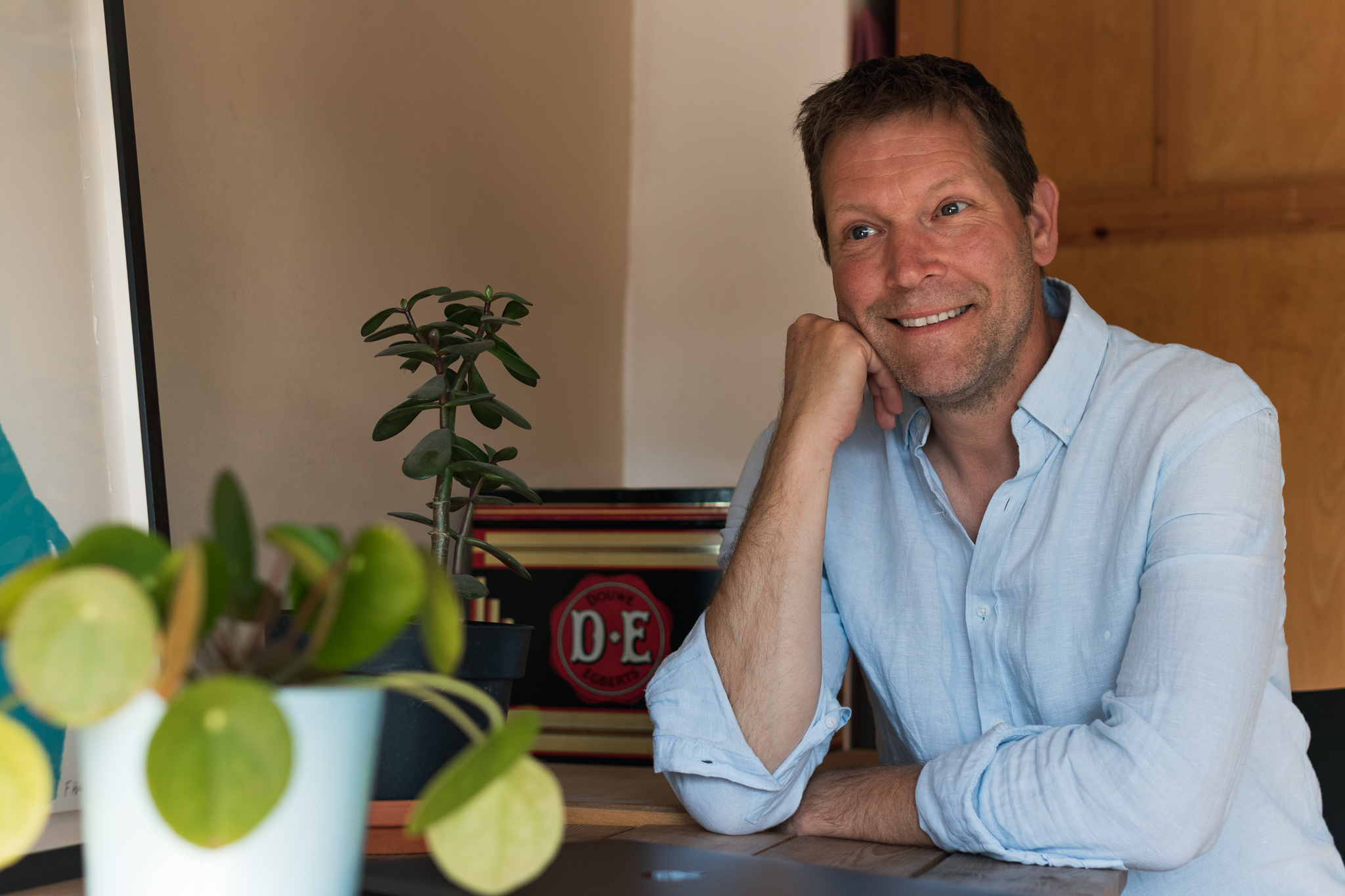Studium Quarantine: working from home with Jaap Janssen
Since 16 March, the team of Studium Generale have been working from home. Normally speaking, you often see us during our lectures and other activities, but now we‘ve been working at home for almost thirteen weeks. As we can’t see each other ‘in the flesh’ at the moment, we’re sharing written and visual portraits of our programme makers with you. This week: an interview with Jaap Janssen, programme maker with Studium Generale.
How long have you been working with Studium Generale Maastricht?
I’d have to check, but I think it’s about 15 years. Maybe it’s good to know exactly. Hang on, I can check it straight away…. February 2004. 16 years. That’s quite a while.
Rob went to art academy. What’s your background?
I went to the Frederik Muller Academy, in Amsterdam, to train for the publishing profession. That was about twenty or thirty years ago. Nowadays, it’s called Media, Information and Communication.
Eventually, I worked for different publishers as a freelance editor: for Athenaeum-Polak & Van Gennep, Querido and Prometheus Bert Bakker. I did all sorts of things, including classics by Plato and fiction by Herman Brusselmans. Alongside the work, I was also studying Dutch language and literature at the University of Amsterdam. I still had a student grant I wanted to use up. And I thought it was important, because although I had a good feeling for language, I wanted to learn how to properly articulate what I thought was wrong with a text and what I wanted to change.
Life as a freelancer was quite lonely. I was at home for eight hours a day doing editing work in my little room. So I went to work at Boom Uitgevers Amsterdam. Besides philosophy, history and sociology, they also published Boom Klassiek; beautiful bound books of classic philosophical works.
You’ve been with Eline for a long time now.
Eline and I have known each other since the Frederik Muller Academy. Eline was also in the publishing world. She worked with the publisher Mai Spijkers, who set up Uitgeverij Prometheus, along with Eline and a few others. They were housed in the old Herengracht conventicle, all with their desks in one room. Once in a while, Ischa Meijer came straight into the church on his old bike and rode past all the desks. He usually went to Eline to steal a roll-up.
Eventually, we “ebbed away”, as a friend called it. I grew up in Limburg. At a certain point, we had a son. We lived in a small room on the third floor, in Amsterdam, where with great difficulty we put in a wall, so that he could sleep on his own. We wanted more space and occasionally went to a holiday home in South Limburg. We liked the atmosphere and the landscape. And we thought: if we do go, then we’ll go properly.
In the end, we found a house in Eyserheide. A really charming little village with twenty houses. The Amsterdam removal men who took us there didn’t understand what we were going to do there, in the middle of nowhere. They went for a walk around the neighbourhood and came to the conclusion that there really wasn’t anything else there.
Did you come here thinking ‘I’ll see what I do when I get there’?
I had a loose/fixed agreement with Uitgeverij Boom. The idea was that I would ‘telework’, as it was called then. But more or less as soon as we started living here, I became project manager with Total Design: a distinctive graphic design agency that made its mark in the Netherlands, founded by people like Wim Crouwel and Friso Kramer.
In 2004, I joined Studium Generale, which really appealed to me. Originally, I responded to a vacancy for a PR and communications advisor. Slowly but surely, I also started organising programme items, along with the students – debate cafés and science cafés.
Has it changed much over those 16 years?
We’ve diversified more. We used to have mostly lectures, but now there’s also Let’s Talk and Ask the Scientist. In the beginning, we did have a lot of cultural activities, like an open mic, International Comedy Night and the Amsterdam Cabaret Festival, as well as world music and pop music. Kensington once performed for Studium Generale in a small theatre somewhere. So did Tim Knol. It’s nice that we’re now trying to bring back a bit more culture, with things like the Poetry Nights. But it has to stay in balance. The lectures and academic education are our core business.

Are you trying to get more literature into the diary, in view of your background?
I’ve noticed that the literary programmes don’t work as well here. We don’t have a real literature faculty, like other university towns. But if you do it in English, then groups of international students turn up. They’re often interested in poetry. We don’t do classical reading evenings, but things like slam poetry or Instagram poetry.
What do you enjoy making programmes about?
Geopolitical themes really interest me. I follow current affairs, watch BBC and keep up with what’s happening internationally. I also think Europe is an interesting theme and that the climate/environment is very important, and history lectures on particular topics interest me. And I really enjoy the astronomy lectures. They’re so exciting, as if you’re delving into a fantasy world. I completely abandon myself and listen breathlessly for an hour to someone sketching all those pictures. It’s like a voyage of discovery.
How is the programme actually compiled?
We have a programme meeting where everyone contributes ideas. We also have a Studium Generale Committee, which comprises representatives from the various faculties. We meet regularly with them to brainstorm. It’s important to put together a varied programme and have a good mix between our own ideas and those of our partners.
Is that diversity also applied to the choice of speakers?
We really keep an eye on diversity, but we don’t always succeed. Sometimes, we only have men, for example. Then we take each other to task for it. And if we don’t, then our public does. If you have a panel of four men for a debate café, then you hear about it. We’re very conscious of it. For our SQ Talks, we have quite a lot of women. But it’s difficult. The balance isn’t great in the academic world. Professors are often white men. So we try to look further afield, in order to get a greater diversity of speakers.
And there’s no programme at all at the moment.
I didn’t see it coming at first, but as time went on it was only to be expected. But we’re missing our unique selling point: the live interaction and personal exchange of information, insights and backgrounds about social and scientific developments. And debating together. I think that’s extremely important to a university and there’s a great need for it.
Isn’t sitting listening for so long a thing of the past?
I think maybe it’s actually a thing of the present. There’s so much information overload today. Everything has to be faster; you’re constantly switching from one device to another. What we offer is the time to really go into a subject in depth and to enter into dialogue with others. Nowadays, students are trained to specialise more and more. You should expect university students to be able to enter into the social debate. We provide that broader view and background.

You’re working from home at the moment. How’s it going?
You make the best of it, but I’ve found out how important it is to actually see people and talk to them. It all becomes so flat with a screen in between. There are so few ups and downs. I also prefer work and private life to be separate. It can’t be good to mix them up. I see few people outside my own family. And it’s so much effort to make appointments with people. You’d imagine that you’d have more time for your family now, but we’re all sitting at home working or studying, and doing our own thing. I’d prefer to keep it all separate.
My son is studying Industrial Engineering and Management Science in Eindhoven. And my daughter is studying Industrial Product Design in Rotterdam. She has her own room there, but she’s decided to stay with us while she’s studying at home.
Now we’re all working at different times of the day, are you sticking to office hours?
I try to, but especially if it’s nice weather I think, ‘I’ll just go out for a walk and then I’ll work on in the evening’. And I often start at seven in the morning, because I’m awake already. I do find it quite confusing that the work and home situations have become one amorphous jumble.
You’re actually quite negative about working from home.
It’s also to do with being in the same place all the time. Normally, you get a lot of energy and inspiration from doing other things and going to other places. Being in one place all the time is killing. Research has been done into it. Seeing new worlds is good for your brain. It helps your cognitive functions and helps you remember things. Gaming is actually good as well. Then you step into another world, even if you’re really in the same place.
Have you considered gaming?
No. (He laughs.) It’s not really my thing. But I do need to break that set pattern every so often. That’s something that Studium Generale does too – get you to think outside your set patterns. I always try to programme speakers and topics that give you a different view of things. Besides reading, I go to theatres and museums a lot. You can’t do that sort of thing any more at the moment. Last week, on Zoom, I ‘went’ to see a play by Toneelgroep Maastricht, based on a book by Ilja Leonard Pfeijffer. But it’s not like the real thing. You can’t get totally immersed in it, because you’re sitting at home on the sofa.
Finally, a question about the coronacrisis itself. At the moment, there’s a lot of criticism of the measures. What’s your opinion?
For a long time, the advice from the RIVM led the way, but now it’s becoming an increasingly political decision. The economy is becoming more important. I do hope that the coronacrisis gets people thinking, but I’m also afraid that when everything goes back to normal, people will soon revert to their old habits. The way we live with one another isn’t perfect; it has its disadvantages. There’s a very apt statement from Damiaan Denys, the Belgian psychologist: “The coronavirus crisis bears the DNA of our modern lifestyle: consumerism, globalisation, mediatisation, individualisation, technocratisation and a secret desire for lost sacrality”.
I have mixed feelings. Because of corona, they’re now seeing blue sky in China, where smog used to be the norm. On the one hand, I want to get back to normal quickly, but we really have to do things differently with regard to the environment and climate. Otherwise we won’t survive.
So how should we do that?
On the one hand, there’s the gradual path, which we were already taking. Everything stopped suddenly because of corona, but that’s not realistic. It has to be done gradually, but then at such a speed that we’re on time and can still help things.
Text and visual material by Amber Helena Reisig.